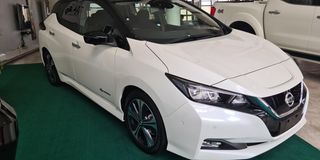When it comes to cars, the future is electric

What you need to know:
Apart from being safe for the environment, electric cars are also easy and cheap to maintain since they do not use fuel.
Paul Kateregga owns a purely electric car, a Nissan Leaf 2014 model. It is a five seater sedan he has owned since November 2019, with a maximum speed of 160km/hour.
Among the interesting features it has is the mortar that replaces the ordinary combustion engine, a battery that stores power upon recharging, an inverter, which converts power from the battery from direct current to alternating current and forwards it to the electric mortar, which then rotates the wheels to enable the vehicle move.
After one month of driving the car, Kateregga recalls saving approximately Shs530,000 he would have used to buy fuel. Kateregga adds that he also saves money meant for oil changes and hydraulic top-ups as well as other car lubricants.
“Its service is done after 12,000km. It involves checking the tyre pressure, wipers and headlight or bulbs,” Kateregga explains, adding that it runs on special brake fluid sold at approximately Shs47,000 per litre.
According to Kateregga, the car is economical and can travel 7.6kms using one kilowatt of power, which is equivalent to Shs820, compared to approximately Shs4,000 you would pay for a litre of fuel. When he charged it from his home the first time, it consumed 15.3kilowatts of power, which gave him a 143 kilometre drive range. Kateregga’s electric car has 107horsepower and is equally fast, with capacity to pick-up speed from 0-100km/h in 10 seconds and from 0-160km/h in 20 seconds.
Safety
Richard Bamujje, the marketing executive at Nissan Motorcare, emphasises that for safety, electric cars are made with lots of insulation. The weight of the charging cable shows the level of insulation.
The ports into which the plugs are placed cannot be touched physically.
“Electric cars are designed to withstand all kinds of weather conditions. Even if it is submerged in water, the water will never go into the sensitive parts of the car. It also has the capacity to manoeuvre through any terrain because they are tried and tested in every condition before putting them on the market,” Bamujje explains.
Charging infrastructure
Bamujje says since electric cars are sold with a charger, it is possible for one to install a charging point at home. He adds that it takes approximately four hours to fully charge the car.
Cost
Bamujje says a brand new electric car at zero mileage with a three-year warranty or 150,000km will cost you $50,000 (approximately Shs185m) and are available at Motorcare Uganda.
The only lubricant an electric car needs, Bamujje explains, is a special coolant that is applied to minimise the flow of pressure in the battery and this can serve you up to 15 years without replacement. Electric car batteries are designed to last 10-12 years.



